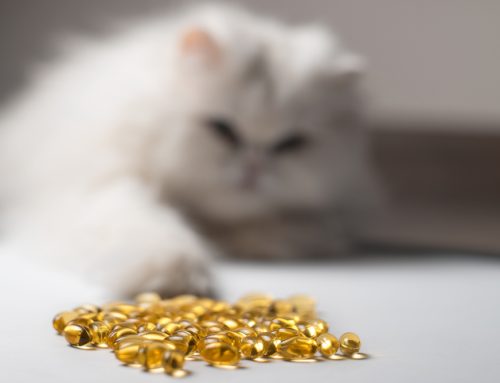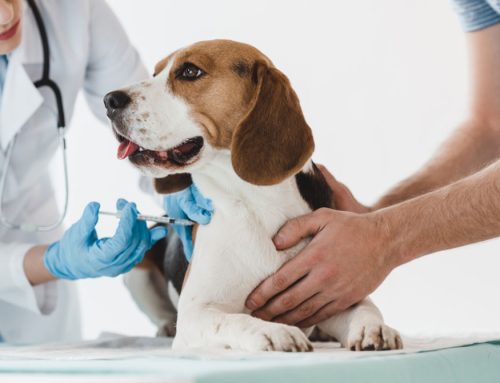Vitamin D is an essential nutrient for pets, but according to a Tufts University study, up to 75% of dogs and 80% of cats are vitamin D deficient, especially those with chronic illnesses that can range from cancer to allergies. Meridian Veterinary Care can provide regular testing and veterinarian-supervised supplementation to improve your pet’s condition, reduce clinical signs, and enhance their overall health.
Vitamin D’s role in pet health
Vitamin D is one of the most critical components of pet health. However, dogs and cats cannot synthesize (i.e., make their own) vitamin D, or get enough from sun exposure like people, and must rely instead on dietary supplementation. Dietary vitamin D is converted by the liver into its useable form and then dispersed throughout the body for various critical functions, which include:
- Absorbing and regulating calcium and phosphorus — Accurate homeostasis is essential for bone development and kidney health.
- Controlling muscle and nerve function — Calcium regulation ensures healthy muscle function and nerve conduction.
- Regulating the innate immune system — Vitamin D is an antioxidant and free-radical fighter, and provides a strong defense for the body.
- Assisting with cell differentiation — Vitamin D plays a role in determining how cell functions are assigned, based on the body’s need.
- Preventing cell proliferation — Vitamin D helps stop cells from rapidly multiplying, a hallmark cancer action.
- Acting as an anti-inflammatory — Vitamin D protects the body from chronic inflammation caused by disease.
Vitamin D deficiency in pets
While no direct cause-and-effect relationship has been determined, according to human and pet vitamin D research, low vitamin D levels are often found in patients with the following conditions:
- Cancer
- Atopic dermatitis (i.e., allergies)
- Other inflammatory diseases (e.g., inflammatory bowel disease, pancreatitis)
- Autoimmune disorders
- Heart disease
- Chronic kidney disease
These conditions, which may be affected by insufficient vitamin D intake, likely also affect the pet’s ability to absorb vitamin D or to convert dietary vitamin D to the form used by the body.
Unfortunately, identifying and addressing low vitamin D isn’t exactly simple. Many commercial pet foods and homemade diets do not contain adequate or usable vitamin D, and pets with insufficient vitamin D show no visible signs, with one exception—puppies and kittens may display altered bone growth (i.e., rickets). Also, prophylactic or precautionary supplementation with over-the-counter products is not recommended, as vitamin D toxicity can be life-threatening to pets.
Testing your pet’s vitamin D level and effective measurement and management can be performed only by the Meridian Veterinary Care team.
Vitamin D testing for pets
If your pet has been diagnosed with any of the above conditions, you may already know about vitamin D testing. At Meridian Veterinary Care, we routinely recommend that we test affected pets—especially those with common inflammatory diseases, such as cancer and allergies. Vitamin D testing is simple and convenient, and requires only a small blood sample that is sent to an external reference lab for analysis.
Once we receive the results, your pet’s veterinarian will determine whether supplementation is necessary, and the dose and form.
Treating vitamin D deficiency in pets
Pets with low vitamin D can benefit from veterinarian-supervised treatment. Depending on your pet’s needs and lifestyle, this may include:
- Diet change — Our veterinarians will review your pet’s current diet to determine the vitamin D amount they are presently consuming. Based on their findings and your feeding preferences (i.e., commercial diet, home-cooked, raw), you’ll receive specific recommendations to replace or modify your pet’s food. Fresh ingredients, such as fatty fish, are an excellent vitamin D source.
- Supplementation — Veterinary vitamin D supplements are available in capsule, liquid, and chewable forms. However, always follow your veterinarian’s product and dosage recommendations to avoid a toxic overdose. Never use human vitamin D supplements for pets, and store all supplements—especially flavored chews and tablets—out of reach to prevent accidental overdose.
Monitoring vitamin D levels in pets

After a three-month period, we’ll recheck your pet’s vitamin D test levels. If the new results are within normal range, we likely will recommend that you continue your pet’s supplementation or new diet, and that we retest every 12 months at your pet’s annual exam. If your pet is still vitamin D-deficient despite supplementation, the veterinarian will modify their dosage or suggest additional laboratory testing to determine if a hidden illness is to blame.
Ideally, as your pet’s vitamin D levels improve, you will notice that their clinical signs have been reduced and their body condition has improved—however, this is pet-dependent and not always appreciable.
Vitamin D—the little known key to pet health
Most pet owners are familiar with annual heartworm tests and intestinal parasite screenings, but not vitamin D testing. This rarely used but convenient and easy test can unlock powerful information about your pet’s health, and can enhance or extend their life. To learn more about vitamin D testing or to schedule an appointment for your pet, contact Meridian Veterinary Care.







Leave A Comment